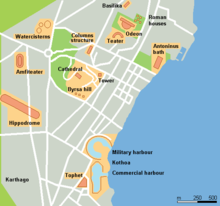Battle of Carthage (698)
This article needs additional citations for verification. (September 2014) |
| Battle of Carthage | |||||||||
|---|---|---|---|---|---|---|---|---|---|
| Part of the Muslim conquest of North Africa and the Arab–Byzantine Wars | |||||||||
 Roman Carthage was destroyed, its walls torn down, its water supply cut off and its harbours made unusable. | |||||||||
| |||||||||
| Belligerents | |||||||||
| Umayyad Caliphate | Eastern Roman Empire | ||||||||
| Commanders and leaders | |||||||||
| Hasan ibn al-Nu'man |
John the Patrician, Tiberius Apsimarus | ||||||||
| Strength | |||||||||
| 40,000 | Unknown | ||||||||
| Casualties and losses | |||||||||
| Low | High | ||||||||

The Battle of Carthage was fought in 698 between a Roman expeditionary force and the armies of the Umayyad Caliphate.[1]
Background[]
Having lost Carthage to the Muslims in 695,[2] Emperor Leontius[3] sent the navy under the command of [4] and the droungarios Tiberius Apsimarus. They entered the harbour and successfully recaptured it in a surprise attack in 697,[3] which resulted in the city's Arab forces fleeing to Kairouan.
Preparation[]
Emir Hasan ibn al-Nu'man was in the middle of a campaign in the Greater Maghreb region but withdrew from campaigning in the field to confront the renewed Roman challenge to the emerging caliphate. He drew plans at Kairouan to retake Carthage the following spring.[citation needed] It is estimated that he headed a force of 40,000 men.[5] The Romans sent out a call for help to their allies, the native Berbers, and to enemies the Visigoths and the Franks.[4] Despite the king of the Visigoths, Wittiza, sending a force of 500 warriors[citation needed] to help defend Carthage, the Romans were in disarray because of infighting and were sapped of much of their strength.
Battle[]
Hasan ibn al-Nu'man, enraged at having to retake a city that had not resisted the Roman takeover, offered no terms except to surrender or die.[citation needed] Emperor Leontius had also given his forces instructions of victory or death. The Romans left Carthage and attacked the Emir's army directly but were defeated, and the Roman commander decided to wait out the siege behind the walls of Carthage to let the Arabs exhaust themselves, as he could continue to be resupplied from the sea. The defenders were faced with Hasan's overwhelming force deployed in ferocious attacks as his men made repeated attempts to scale the walls with ladders. They combined the land assault with an attack from the sea that caused the Roman commanders to withdraw from the city, and subsequently resulted in the second and final great destruction of Carthage. The Romans retreated to the islands of Corsica, Sicily and Crete to resist further Muslim expansion. The battle ended 750 years of Roman control of Africa.
Aftermath[]

was later murdered after a conspiracy at the hands of his co-commander, Tiberius Apsimarus. Instead of returning to Africa to fight the Muslims, Tiberius Apsimarus sailed instead to Constantinople. After a successful rebellion, he rose to the throne as Tiberius III,[4] and was later deposed by former emperor Justinian II, now known as the Rhinotmetus.
The conquest of North Africa by the forces of Islam was now nearly complete. Hasan's forces met with resistance from the Zenata tribe of Berbers under al-Kahina,[6] who inflicted a on him and drove him back to Barqa. However, in 702 he received strong reinforcement from Caliph Abd al-Malik. Now with a large army and the support of the settled population of North Africa, Hasan pushed forward, decisively defeating al-Kahina in the Battle of Tabarka, 85 miles (136 km) west of Carthage. He then developed the village of Tunis, ten miles from the destroyed Carthage.
References[]
- ^ "Tunisia - Carthage". www.sights-and-culture.com. Retrieved 20 September 2012.
- ^ "ʿAbd al-Malik". www.britannica.com. Retrieved 20 September 2012.
- ^ Jump up to: a b "Leontius". i-cias.com. Retrieved 20 September 2012.
- ^ Jump up to: a b c Moore, R. Scott. "Leontius (695-98 AD)". www.roman-emperors.org. Retrieved 20 September 2012.
- ^ "Battle of Carthage (698)". www.myetymology.com. Retrieved 20 September 2012.
- ^ "The Kahina". awalimofstormhold.wordpress.com. Retrieved 20 September 2012.
- Battles involving the Byzantine Empire
- Battles involving the Umayyad Caliphate
- 698
- 690s conflicts
- 690s in the Byzantine Empire
- Carthage
- Battles of the Arab–Byzantine wars
- Muslim conquest of the Maghreb
- 690s in the Umayyad Caliphate
- Archdiocese of Carthage
